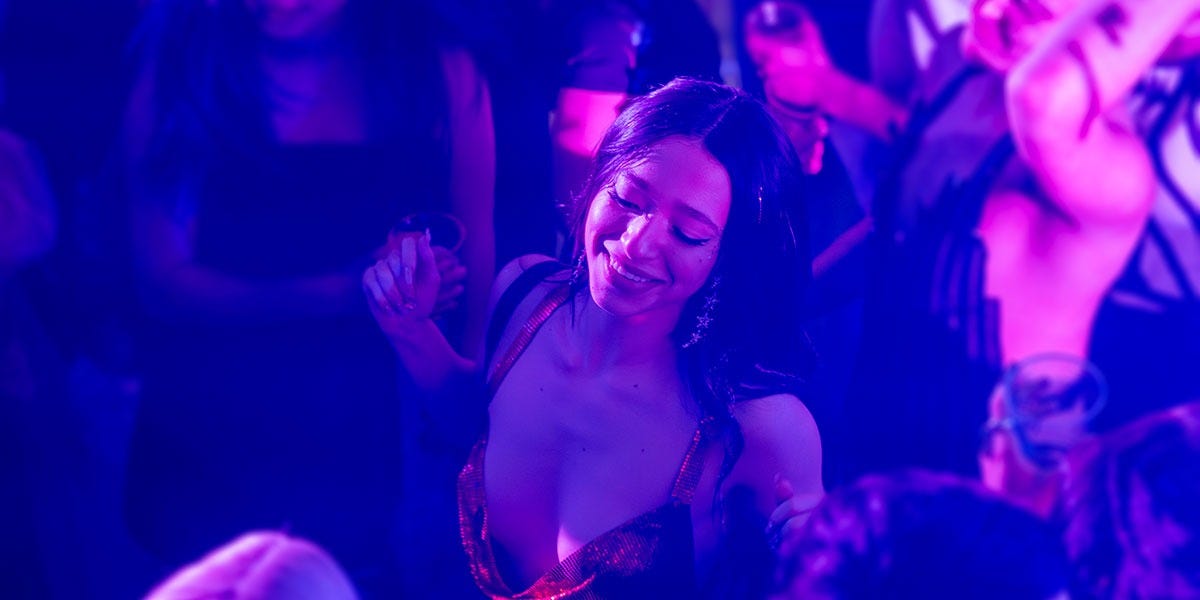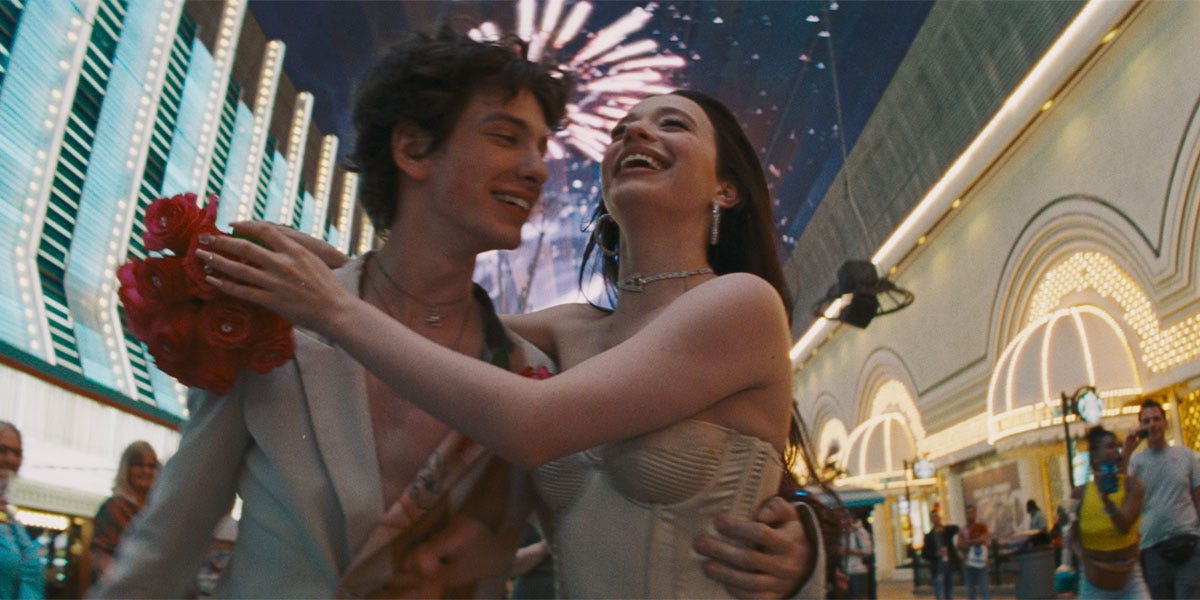'Anora'—A Cautionary Tale On the Perils of Trusting Rich Men
“Jealousy is a disease, babe! I’m just gonna go chill in my mansion or whatevah!”
This review is part of Guest Writer Laya Lee coverage from TIFF 2024.
Slight spoilers ahead!
Ever since coming out as a trans woman, I’ve become increasingly existential about my relationships with men. Because I’m not exclusively attracted to men, I wonder what the implications are if I choose to date one. Has compulsory heterosexuality won yet again? By dating men, am I inherently centering them in my life over women or non-binary people? I know, I know. Trans, Asian, and attracted to men—the tragedy of intersectionality. Godspeed and good luck to all those who can’t seem to pick a struggle (just kidding).
As I’ve navigated the newness of transition over the years, I’ve been sifting through ghosts of lovers' past. Dating cis men has unfortunately come with exposing myself to the fetishization of my body and transphobic ideas about the ways in which I’m different from cis women “because I know what men want.”
I’ve had to evaluate how different relationships have been informed by scarcity, carried by a fear that each man who was attracted to me would be the last. Since I was little, I worried endlessly that I would end up alone as a queer person, and as I became a teenager I figured that marrying a man might be the solution to avoid such a dismal fate. Since then, I placed immense pressure on finding ‘the one’.
So when I read the logline for Sean Baker’s newest film Anora—”a young sex worker’s Cinderella story”—I was instantly sold. I’ve always appreciated and deeply respected Baker’s commitment to destigmatizing sex work in his previous projects such as Tangerine and The Florida Project. I am not a sex worker myself, but I’ve connected with friends who do sex work about the complexities of performing submissive femininity for men.
Often in my relationships and encounters with men, I would tell them what they wanted to hear, I would do what they wanted me to do, and I would make them feel safe around me. In Anora, I recognized that same potency that Mikey Madison’s (Better Things, Scream) titular character wielded when she danced for men. The personas she took on with different clients felt familiar, even if I hadn’t fully considered the submissiveness I displayed in the persona I had slipped into at the time. I somehow got the idea that doing this allowed me to feel closer to them—when really I had just convinced myself that being with men validated my womanhood, even if I made myself small doing so. What a dystopian idea. I wonder where I picked that up.
Whether she’s working the pole or convincing men to buy a lap dance, there’s no doubt that Ani, short for Anora, is seasoned as a performer. “I was interested in who she would be when she was alone or with her friends,” says Madison on her approach to playing Ani. “And I wanted to play her as someone who’s not very self-aware, which in some ways is a protection.”
The notion that Ani feels empowered by her work—or by moving in and out of these personas—is a complicated but easy assumption to make as a viewer. At times, making sense of who I was when alone with men vs. who I was alone with myself or with friends, was difficult. We all occupy different roles in our lives, but those two worlds, they both felt very separate. These days, where I am a lot more cognizant of the ways I perform my sexuality for others, it feels impossible at times to slip into old roles of the docile paramour, at the risk of losing my sense of who I am beyond any masking.
Non-strippers watching can only imagine the challenges of erotic dancing & working in a club. Not just the required athleticism and physical control, but the challenges of staying in character in front of clientele. When her night is over, she stacks her cash and then sleeps on the train home, wearing oversized parkas and no makeup.
She sleeps during the day, only to be awoken by her sister, who she lives with, about whether or not she’s picked up groceries. This is Anora’s reality outside of work, one that she’s left uninspired and disgruntled with and seeks to break free of via her work. Anora seeks to drive home how easy it is to lose yourself in the work of building a fantasy, making it hard to differentiate between what’s real and falsely constructed.
When I look back on former situationships, I don’t think the men I found myself with questioned who or what was beyond the curtain of my performed lust. I sensed from them a similar decision to submit to the fantasy of fabricated intimacy before us, without much self-awareness on either of our parts.
Even Ani gets swept up in the allure of this similar fantasy she creates with her clients when her boss assigns her to show Ivan, played by Mark Eydelshteyn (Monastery, Smychok) a good time. The impetuous son of a Russian oligarch, Ivan, who encourages Ani to call him Vanya, is a boyish trust fund baby and an easy-to-please client whose affluence and wealth seem to know no bounds. “A lot of dancers and sex workers told me that young men are not big spenders and are generally trying to get the most out of their buck,” Mikey Madison says. “But Ivan turns out to be this refreshing character. He's not threatening at all; he's fun, funny, and around Ani’s age. And Mark plays his character so sincerely at first that she’s just charmed by him.”
The quick vignettes we get of Ani with customers are glamorized but Sean Baker peels back the curtain occasionally to show us the grounded, real conversations between the dancers. Laughing at the fucked-up things clients say, complaining to their boss about the shit working conditions, and complimenting each others’ jewelry (“I got dollar signs like a real ho.” “No, but you’re manifesting with those.”) I love honest moments like these. It’s almost too easy for audiences to assume that sex work displayed on-screen is empowering for its characters, when the truth is more complicated. Sex work is just work, with all its usual challenges, but often gone unprotected and disrespected.
Yet it would also be dishonest to pretend that there isn’t an occasional rush that comes with being good at what you do. In a world where the male gaze often enables violence against women, being able to profit off of or exploit a man’s desire comes with a satisfaction that can convince you that you’re invincible. Ani reaps the rewards from this high, always leveraging her position with her clients for something better—like when she goes freelance with Ivan by giving him her number. That feeling of empowerment is seductive in itself, even if short-lived at times.
So when Vanya offers Ani the opportunity to be exclusive with him, you can sense she is enticed by the prospect of something more akin to a traditional romantic relationship. Ani remains trepidatious, stroking up a paid deal with him (“15. Cash upfront”), but the prospect of getting to experience ‘real love’ hangs above her as the two get wrapped up in their appreciation and curiosity of one another.
It’s not delusional, but rather very human to yearn for emotional intimacy or to question if there’s a chance for something real, even if the connection in front of you comes with no real assurance of commitment.
“I think he wants to be with Ani from the very beginning,” says actor Mark Eydelshteyn of Vanya’s inner world, “but he can’t be honest with himself and he's scared of responsibility. So he asks her to be his honey-girlfriend for a week. It’s a strange form of love.”
The two are swept up in a fever dream montage of sex, drugs, and partying, ending on an impromptu Vegas bender that ultimately ends with the two impulsively tying the knot. When Ivan’s parents catch word of the surprise union, they seek for their son’s marriage to be annulled—flipping the genre switch in Anora from Spring Breakers to Uncut Gems that sours the Cinderella fantasy that Anora finds herself in.
The story at the heart of Anora is no doubt a tragedy. It evokes the dark reality on the other side of the fairytale that women are so often fed: that a man will come into your life, sweep you off your feet, provide for you and keep you safe. Even when all of us turn our nose up at this gauche and reductive narrative, we’re confronted with variations of this myth time and time again in how we’re conditioned to think of monogamy, of gender, of labor.
I find it so interesting that Anora is marketed as a love story. I certainly never personally found Ani’s affair with Ivan romantic—sexy, maybe…$15,000 and a mansion is definitely sexy. But, maybe it's because I've learned the hard way that many men will confuse how you make their lives easier with how much they actually love you. I think perhaps the film is much more accurately described as a cautionary tale about placing trust in untrustworthy parties—or perhaps even an exposé on the dangers of believing anything rich men say.
Anora is out in theatres this October.
EXTRAS:
Mark Eydelshteyn is sooooo damn funny. His physical comedy as Ivan is unparalleled — like if Ferris Bueller was a rich stoner twink.
Anora has one of my favorite movie soundtracks from this year — featuring t.A.T.u, Slayyyter, Brooke Candy, Blondie, and more.
At the TIFF Premiere of Anora, I had the chance to speak with Andrea Werhun, author of Modern Whore and script consultant for the film. When asked about the takeaway for sex workers watching the film, she said:
“I think the goal should always be opening the door for other sex workers to share their own experiences… let’s face it, we need to have more sex workers telling their own stories. We need to support sex workers as filmmakers, as storytellers, as producers, as writers to continue this lineage of storytelling and I think what Sean [Baker] does as an ally is open the door.”
If You Liked This Edition of Hi Shelli!
Here is something from Laya’s Substack you might really fuck with!
Thank you so much for reading Hi Shelli!
As always, all reviews are in front of the paywall and if you like what you read I hope you consider becoming a paid subscriber <3







